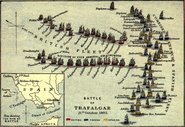When historians talk of blunders that could have been avoided, they all point to Hitler's fateful decision to invade Russia during World War II. Had he read of the account of Napolean's ill-fated march of typhus and frostbite coming back from Moscow in 1812, Hitler may have thought otherwise than have his Wehrmacht embark on Operation Barbarossa. My question is why the somewhat positive outcome of the combined German-Austrian army in Russia is not ever mentioned. Although the Austrians rarely could defeat the Russians on their own during the Great War, the Germans handily defeated Russian armies year after year until their capitulation.
Reading about the American-Japanese Naval conflict during WWII, I could not help but think that the Japanese must have read too much into history. While Alfred Thayer Mahan's impressive Sea Power tome and Lord Nelson's victory at Trafalgar were certainly a must-read for admirals and naval war planners during the age of sail, the advent of the aeroplane changed warfare into a third dimension. By the time of WWII, the rules of war had changed entirely from Nelson's 1805 victory. Battleships or "dreadnoughts" would not rule the waves any longer.
Forward thinking strategists realized that the air ruled over the sea. When Japan attacked Pearl Harbor on Dec. 7, 1941, both US aircraft carriers were at sea. Although the Japanese planes did considerable damage to the Pacific fleet that day, the Americans did not lose their most vital asset in the Pacific, their carriers. And some Japanese knew it. America's material might would eventually overwhelm the Japanese.
The Japanese were fighting a war and based victory on their fighting spirit. In an age of technology and innovation, fighting spirit would not carry the Rising Sun to victory over the Americans. They believed the arrogant soldiers and sailors would not last in a war of attrition, that American housewives would lower morale by abandoning their men off at war with interlopers back home, and heaven was on the side of the Japanese. It turns out Japanese "Night Vision" was no match for American radar and bullets fly just as fast and straight from an arrogant gun as they do from one with superior fighting spirit.
Technology, especially superior weaponry, were outclassed by determination in Vietnam, completing the cycle of triumphs: Technology over the will, the will over technology. Current strategies are always forged on the tails of past ones. Napolean's cannon overwhelmed the practice of line infantry battles, although the Americans did not take the cue and weaponry of the American Civil War wrought disatrous casualties on Confederate and Union ranks. Outflanking and troop movements of the late 19th century were outdated by the Great War in Europe. In turn, static defenses such as trenches and the Maginot Line were rendered obsolete by tanks, planes and blitzkrieg tactics. In the same way, Nelson's strategies of headlong attack and victory by superior seamanship and determination were lost in the shuffle of improving technologies. But just like Stalin's winter ultimately stopped Hitler's blitzkrieg, 'Nam's jungles and moisture crippled America's might.
It is remarkable to me that men and women's lives are thrown away because proper contextual elements are not included into modern war planning. American strategy in Vietnam failed because enemy units could not be located and brought into a set-piece battle. Technology could not be used because there was no one to use it on. The short-sighted strategy did not include the intangibles.
Recently, the intangible elements were not followed again. 3020 American soldiers and countless Iraqi civilians later, there is no end in sight, yet we were declared a winner years ago. With infrastructure standing upon the fall of Baghdad, the administrators and soldiers were told to go home. Then we brought in novices from America with no experience with the local custom, language or economics to run the country.
The problem stems from improper planning. American war planners did not anticipate Iraqi organized military resistance to be none-existant. Without a plan for Iraq after the takeover, American soldiers were left with occupational duties they had not trained for. The strategy had not included all the intangibles; in this case, no resistance and a vicious vaccum of power. Nobody did seem to think of the possible outcomes when Saddam fell from power. No one questioned if Saddam's brutality was the result of a populace that could not be controlled without force. The only problem with not knowing: It is their job to know the outcomes of their decisions, especially when planning a pre-emptive war. Ignorance cannot be used as an excuse.
So with Bush now committing 20,000 new troops to Iraq, he does so with a new strategy for doing a better job training Iraqi troops and a threat of pulling the American blank check from the Iraqi goverment's hands. I am not enthusiastic about Bush's plan or his integrity: He is simply and obviously trying to pass the Iraq debacle on to the next president. While the situation seems like it could not be any worse, the president's next hard sell to the American people is a plan, a strategy that involves more Americans troops and more anticipated loss of life. Although I hope Americans are not really foolish to believe that Bush is doing anything other than prolonging death and destruction until 2009, we all hope that we can move forward, stop the violence and killing, and secure peace in Iraq. Unfortunately Bush, Cheney, Rumsfeld (more like Rumsfled) and the rest of the warhawks "drew up their plan on the back of a matchbook without thinking. It was the plan of a boy." And instead of keeping these boys playing with their toy soldiers in a sandbox, they are playing with American bodies. When is enough, enough?
Hopefully this "augmentation" (as Secretary of State Rice delicately used in the place of escalation) is teamed with strategic thinking that emcompasses the intangibles. As we all know blitzkrieg may have taken Baghdad, but spirit and determination will not give us victory. We need a real plan that involves intelligence in the place of brawn. This is not to say troops are not needed in sensitive situations, but how do troops stop violence with more violence? Isn't an occupation exactly the kind of thing that prevents true freedom? Moreover, democracy may never have a chance in Iraq because it's not entirely clear whether Shi'ite, Sunni and Kurds could ever possibly co-exist without a violent arm holding them together.
If there is a lesson of history to be learned from the mess in Iraq, it is that current conflicts must be met with current strategy and intelligent thinking. Quitting may save lives now, but with American insistence on Middle East oil as a source for energy, it won't be long before our interests in the region cost more American lives. This is not to say let's stay in Iraq as long as it takes as some suggest, rather, maybe it's time to rethink the costs of basing our entire economy on middle east oil, because foward thinking does safe lives and money. Basing our economy in the past will only serve us future defeat.
11 years ago








No comments:
Post a Comment